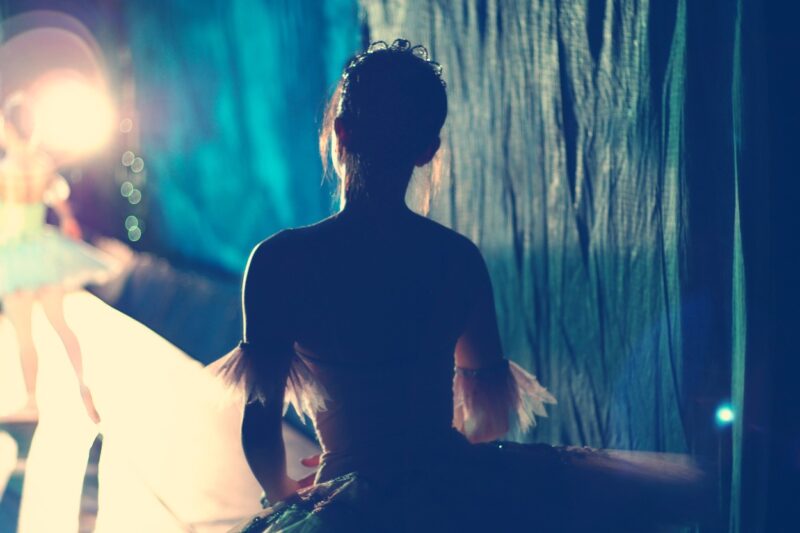“I think of beauty as an absolute necessity. I don’t think it’s a privilege or an indulgence… I don’t think we can do without it any more than we can do without dreams or oxygen.”
-Toni Morrison, The Art of Fiction Interview, The Paris Review
When Europe went to war in 1939, the Sadlers Wells Ballet went to Europe. The small English dance company, which would later grow into the prestigious Royal Ballet, went on tour, performing in any city with a willing audience and a stage.
On that stage, in 1939 and 1940, they performed classics, and world premières, such as a new one-act ballet called Les Patineurs, a “joyous,” “comedic,” “lyrical” story about a day on a frozen lake:
“Groups of skaters – by turns graceful experts, comically clumsy beginners, romantic couples and confident show-offs…”
They performed without male dancers; the men had been conscripted. Without stockings, heat, or pay. Sometimes, without slippers. They performed solos and pas de deux and adagios, as long as there was a stage. And there was, and an audience for romance, laughter, skating on frozen lakes, in Europe in 1940. One night, on the 9th of May, the troupe was showered with daffodils and tulips at the Royal Theatre in the Hague. The hall was full. The Germans entered the city the following day.
The company barely made it to England, and went straight to rehearsals. And when the Blitz shut down the Sadlers Wells Theatre, it simply relocated. “Morning class served as a roll call to see who was still alive, literally.” Morning class, then one hundred bombs hitting London every day, then Les Sylphides in the evening, if there was a stage and audience.
Les Sylphides is a “romantic reverie” with no plot, just a suite of dances set in a moonlit park: preludes, nocturnes, and waltzes; solos and duets and ensembles of diaphanous nymphs in tulle,
who could hear the bombs as they danced and feel the planks reverberate. They danced, on £4 a week, on food rations, on one pair of shoes per dancer, per eighteen performances. They danced, for audiences of twos and threes, and they danced for full houses. They were invited to tour the country, and so the ballet went. And people went to the ballet, then went without dinner. At the height of the war, the Sadlers Wells Ballet gave 208 performances in one year; currently, the Birmingham Royal Ballet gives 130.
On the 8th of May 1945, the last day of the war, the dancers were performing Coppélia, about a young man who falls in love with a beautiful life-sized doll. When they finished, they danced right out to Trafalgar Square and joined the celebration.
“It’s what we were born for. I think finding, incorporating, and then representing beauty is what humans do. With or without authorities telling us what it is. I think it would exist in any case.”
Dance on slave ships, on plantations, on roofs, around campfires, and kitchen tables, on either side of an Iron Curtain, in nightclubs and bunkers, in the streets, in front of tanks, under tanks and dictators and economic hardship. Under stars on a soft night,
in Kyiv, in Paris.
On the 23rd of February 2022, 38 dancers from the Kyiv City Ballet performed The Nutcracker in Paris; the story of a girl and her enchanted nutcracker prince who triumph against the evil Mouse King one Christmas. On the 24th, Ukraine was invaded.
“We didn’t bring anything. We don’t have music, videos, documents—everything we have is left in Kyiv…” including siblings, parents, spouses, and friends, thousands of whom have been killed, millions displaced, and millions upon millions more trapped. The damage to the country’s cultural heritage is beyond imagination; monuments, art and history museums, libraries, churches, monasteries, theaters…
In Paris, the dancers were given asylum. And rehearsal space, and leotards, and pointe shoes at the Théatre du Châtelet. And classes at the Opéra de Paris, and access to evening performances. And the opportunity to give their own: a stage, an audience.
The Kyiv City Ballet, this month in Paris, waltzed flowers and danced sugar plum fairies, and sent the money to the Red Cross. This week, they began touring in France. Similar performances are being given in the Czech Republic, Hungary, Poland.
“Before the music begins, all our thoughts are all about the situation… but when the music starts,”
It is not true that Winston Churchill, during the darkest, coldest, hungriest hours of World War II, was asked to cut arts funding in favour of the war effort. It is not true that he replied: “Then what are we fighting for?” It is true that “anything that degrades culture shortens the paths that lead to servitude,”
and that beauty is an absolute necessity,
not simply something to behold, but something to do,
and that we cannot do without it any more than we can do without oxygen.
